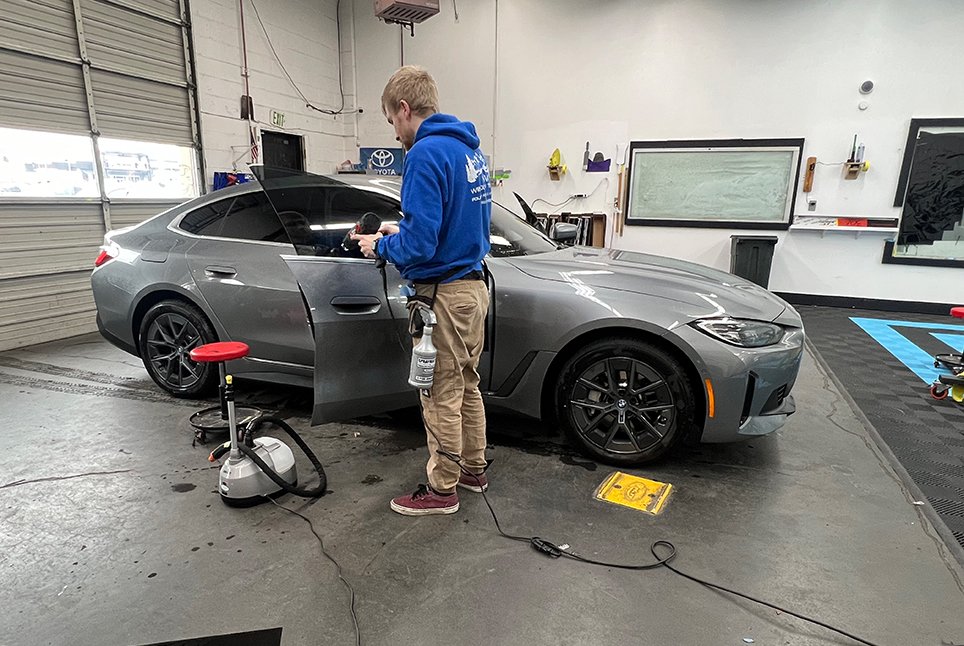Top-Rated Vehicle Window Tinting Solutions in Your Location
Top-Rated Vehicle Window Tinting Solutions in Your Location
Blog Article
Home Window Tinting Laws and Guidelines: What You Need to Know Prior To Tinting Your Car
Before waging home window tinting for your lorry, it is necessary to acquaint on your own with the varied regulations and standards that regulate this practice across various states. These guidelines determine the acceptable levels of color darkness, often determined by noticeable light transmission (VLT) percentages, and include particular stipulations for front windscreens intended at ensuring road security. Furthermore, certain jurisdictions may supply medical exemptions for individuals with qualifying problems. Comprehending these intricacies can save you from possible legal implications, however what are the details regulations in your state?
Overview of Window Tinting Rules
Window tinting legislations are regularly subject to variation across various territories, mirroring neighborhood policies and safety considerations. These regulations determine the acceptable degrees of color darkness and reflectiveness on vehicle home windows, making certain that motorists keep sufficient presence while likewise shielding against damaging UV rays and heat.
Most regulations classify window tinting based upon the Visible Light Transmission (VLT) percent, which indicates the quantity of light that can go through the window. Typically, lower VLT percents indicate darker tints. Laws commonly set apart in between the front, side, and back windows, with more stringent constraints put on the front windscreen to enhance safety and security for both the vehicle driver and various other roadway customers.
Compliance with window tinting laws is essential, as violations can result in fines, required removal of the tint, and potential boosts in insurance premiums. It is crucial for car proprietors to acquaint themselves with local regulations prior to continuing with home window tinting installments.
State-by-State Color Regulations
Recognizing the particular home window tinting laws in each state is essential for vehicle proprietors looking for to abide with the legislation. Each state in the U.S. has developed its very own collection of rules governing home window tinting, which can differ significantly. These policies frequently dictate the allowed degrees of color darkness, the sorts of home windows that can be tinted, and any type of clinical exceptions that might apply.
As an example, states like The golden state have strict limitations on color darkness for front home windows, while others, such as New Mexico, might allow darker colors. Furthermore, certain states mandate specific presence percentages for various windows, including the windscreen, front side home windows, and back windows. It is crucial for vehicle owners to familiarize themselves with their state's legislations to prevent prospective penalties or fines.
Moreover, some states might need a qualification sticker to be positioned on colored home windows, showing conformity with state laws. Failure to stick to these laws not just risks legal repercussions yet can likewise impact safety and presence while driving. For that reason, car owners must conduct extensive research or get in touch with neighborhood authorities to ensure full understanding and conformity with state-by-state color guidelines.
Allowed Tint Degrees and Kinds
Many automobile proprietors might be shocked to learn that permitted color degrees and types vary widely across various states. Each state has actually developed its own laws concerning the permissible darkness and reflectivity of home window tint, typically gauged by Visible Light Transmission (VLT) portions. VLT refers to the amount of light that can go through the tinted windows; thus, a lower percentage shows a darker tint.

Furthermore, the sorts of tint materials enabled can vary, with some states restricting mirror-like or metal finishes. It is essential for lorry owners to acquaint themselves with their state's particular legislations to ensure conformity. Non-compliance can result in penalties, necessary removal of the tint, or other lawful consequences, making it critical to understand these regulations prior to proceeding with setup.
Medical Exceptions for Tinting
While not all states supply allowances for clinical exceptions relating to window tinting, those that do recognize the need for details individuals to boost exposure and convenience as a result of medical conditions. go to website Numerous medical problems, such as lupus, skin cancer cells, and particular eye disorders, can render people particularly conscious sunlight. As a result, these individuals might require darker tints to protect themselves from dangerous UV rays and glare.

It is necessary to keep in mind that also with a medical exception, there may still be constraints on the level of tint enabled. Compliance with state regulations guarantees that people are both secured and within legal limits. Those considering medical exceptions need to call their local Department of Electric motor Automobiles or equal authority to comprehend the needs and procedures necessary to make an application for an exception efficiently.
Fines for Non-Compliance
Stopping working to adhere to home window tinting regulations can cause substantial fines, which differ by state. Regulation enforcement agencies are encouraged to release citations for lorries that do not stick to the defined tinting guidelines. These charges normally include penalties, which can range from small amounts to a number of hundred bucks, relying on the intensity of the infraction and the state concerned.
In some jurisdictions, repeated offenses might lead to intensifying fines or additional penalties, such as compulsory court appearances. Non-compliance might demand the elimination of illegal tinting, often at the proprietor's expense. In severe situations, habitual offenders may face suspension of their Get More Info lorry enrollment until compliance is attained.
In addition, insurance effects might occur from obtaining several citations for home window color violations. Insurance firms might watch such offenses as a sign of riskier actions, possibly leading to boosted costs or trouble in coverage.
To stay clear of these penalties, it is essential for automobile proprietors to acquaint themselves with their regional window tinting regulations and make certain that their lorry complies (Window Tinting). This aggressive method not just stays clear of lawful ramifications however likewise promotes road security
Verdict

Many guidelines identify window tinting based on the Visible Light Transmission (VLT) percent, which indicates the amount of light that can pass through the home window. Compliance with window tinting guidelines is essential, as offenses can result in penalties, obligatory removal of the tint, and potential rises in insurance coverage premiums.Comprehending the particular home window tinting regulations in each state is crucial for car owners seeking to comply with the legislation. These policies often determine the allowable levels of color darkness, the kinds of home windows that can be tinted, and any medical exceptions that might apply.
For circumstances, states like The golden state have stringent restrictions on color darkness for front home windows, while others, such as New Mexico, may enable darker tints.
Report this page